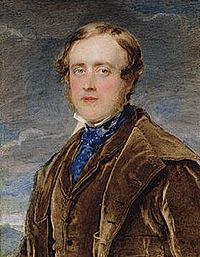.gif)
Edward Ellice (Scottish politician)
Encyclopedia

Scotland
Scotland is a country that is part of the United Kingdom. Occupying the northern third of the island of Great Britain, it shares a border with England to the south and is bounded by the North Sea to the east, the Atlantic Ocean to the north and west, and the North Channel and Irish Sea to the...
Liberal Party
Liberal Party (UK)
The Liberal Party was one of the two major political parties of the United Kingdom during the 19th and early 20th centuries. It was a third party of negligible importance throughout the latter half of the 20th Century, before merging with the Social Democratic Party in 1988 to form the present day...
politician.
He was the eldest son of Edward Ellice
Edward Ellice (merchant)
Edward Ellice the Elder , known in his time as the "Bear", was a British merchant and politician. He was a Director of the Hudson's Bay Company and a prime mover behind the Reform Bill of 1832....
, from his first marriage to Hannah Althea Grey, the youngest sister of Earl Grey
Charles Grey, 2nd Earl Grey
Charles Grey, 2nd Earl Grey, KG, PC , known as Viscount Howick between 1806 and 1807, was Prime Minister of the United Kingdom of Great Britain and Ireland from 22 November 1830 to 16 July 1834. A member of the Whig Party, he backed significant reform of the British government and was among the...
, and was educated at Eton College
Eton College
Eton College, often referred to simply as Eton, is a British independent school for boys aged 13 to 18. It was founded in 1440 by King Henry VI as "The King's College of Our Lady of Eton besides Wyndsor"....
and Trinity College, Cambridge
Trinity College, Cambridge
Trinity College is a constituent college of the University of Cambridge. Trinity has more members than any other college in Cambridge or Oxford, with around 700 undergraduates, 430 graduates, and over 170 Fellows...
. In 1832, he was appointed as Private Secretary to Lord Durham
John Lambton, 1st Earl of Durham
John George Lambton, 1st Earl of Durham GCB, PC , also known as "Radical Jack" and commonly referred to in history texts simply as Lord Durham, was a British Whig statesman, colonial administrator, Governor General and high commissioner of British North America...
for his diplomatic mission to Russia.
Ellice was an unsuccessful candidate for Inverness Burghs
Inverness Burghs (UK Parliament constituency)
Inverness Burghs was a district of burghs constituency of the House of Commons of the Parliament of Great Britain from 1708 to 1801 and of the Parliament of the United Kingdom from 1801 to 1918...
in the 1835 general election
United Kingdom general election, 1835
The 1835 United Kingdom general election was called when Parliament was dissolved on 29 December 1834. Polling took place between 6 January and 6 February 1835, and the results saw Robert Peel's Conservatives make large gains from their low of the 1832 election, but the Whigs maintained a large...
, but was elected to represent Huddersfield
Huddersfield (UK Parliament constituency)
-Elections in the 2000s:-Elections in the 1990s:- Notes and references :...
in a May 1837 by-election
By-election
A by-election is an election held to fill a political office that has become vacant between regularly scheduled elections....
. In the general election that year
United Kingdom general election, 1837
The 1837 United Kingdom general election saw Robert Peel's Conservatives close further on the position of the Whigs, who won their fourth election of the decade....
he was elected to represent St Andrews Burghs
St Andrews Burghs (UK Parliament constituency)
St Andrews Burghs was a district of burghs constituency, representing various burghs of Fife, Scotland, in the House of Commons of the Parliament of the United Kingdom, from 1832 to 1918.-Area covered:...
, a seat he held until 1880.
Ellice continued as Durham's private secretary during his term as Governor General of the Province of Canada
Governor General of the Province of Canada
The Governor General of the Province of Canada was the vice-regal post of pre-Confederation Canada that existed from 1840 to Canadian Confederation in 1867....
; whilst he was working in Canada, his wife was briefly captured during the Rebellions of 1837
Rebellions of 1837
The Rebellions of 1837 were a pair of Canadian armed uprisings that occurred in 1837 and 1838 in response to frustrations in political reform. A key shared goal was the allowance of responsible government, which was eventually achieved in the incident's aftermath.-Rebellions:The rebellions started...
. He remained a backbencher throughout his political career, taking special interest in the reform of the Poor Laws. He supported the idea of "clearance
Highland Clearances
The Highland Clearances were forced displacements of the population of the Scottish Highlands during the 18th and 19th centuries. They led to mass emigration to the sea coast, the Scottish Lowlands, and the North American colonies...
", but viewed indiscriminate forcible eviction of the peasantry as "cruel and indefensible" (Spain, 2004).
He was offered a peerage
Peerage
The Peerage is a legal system of largely hereditary titles in the United Kingdom, which constitute the ranks of British nobility and is part of the British honours system...
by William Gladstone
William Ewart Gladstone
William Ewart Gladstone FRS FSS was a British Liberal statesman. In a career lasting over sixty years, he served as Prime Minister four separate times , more than any other person. Gladstone was also Britain's oldest Prime Minister, 84 years old when he resigned for the last time...
in 1869, but declined the offer, and retired from Parliament in early 1880, shortly before his death.
Ellice married Katherine Balfour, daughter of General Balfour of Balbirnie, in 1834. Following her death in 1864, he married in 1867 Eliza Stewart, daughter of Thomas Campbell Hagart of Bantaskine, widow of Alexander Spiers of Elderslie.

